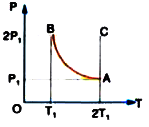An ideal gas has an adiabatic coefficient γ. In some process, the molar heat capacity varies as C=α/T, where α is a constant. Find (a) the work performed by one mole of gas during its heating from the temperature T0 to the temperature η times higher, and (b) the equation of the process in the variable P, V.

PVγ.eα(γ−1)PV= constant
Topper's Solved these Questions
- THERMODYNAMICSBOOK - AAKASH SERIESCHAPTER - THERMODYNAMICSEXERCISE - QUESTIONS FOR DESCRIPTIVE ANSWERS
7 Videos
- THERMODYNAMICSBOOK - AAKASH SERIESCHAPTER - THERMODYNAMICSEXERCISE - Problem
60 Videos
- THERMODYNAMICSBOOK - AAKASH SERIESCHAPTER - THERMODYNAMICSEXERCISE - NUMERICAL EXERCISE (LEVEL-1)
19 Videos
- THERMAL PROPERTIES OF MATTERBOOK - AAKASH SERIESCHAPTER - THERMAL PROPERTIES OF MATTEREXERCISE - ADDITIONAL PRACTICE EXERCISE (LEVEL - II) PRACTICE SHEET (ADVANCED) Integer/Subjective Type Questions
2 Videos
- THERMOMETRY BOOK - AAKASH SERIESCHAPTER - THERMOMETRY EXERCISE - Numerical Exercise (LEVEL- 1)
11 Videos
Similar Questions
An ideal gas has an adiabatic exponent γ. In some process its molar heat capacity varies as C=α/T,where α is a constant Find :
(a) the work performed by one mole of the gas during its heating from the temperature T0 to the temperature η times higher ,
(b) the equation of the process in the variables p,V.
View SolutionAn ideal gas has an adiabatic exponent γ. In some process its molar heat capacity varies as C=α/T,where α is a constant Find :
(a) the work performed by one mole of the gas during its heating from the temperature T0 to the temperature η times higher ,
(b) the equation of the process in the variables p,V.
View Solution
Knowledge Check
The molar heat capacity C for an ideal gas going through a given process is given by C=aT, where 'a' is a constant. If γ=CpCv, the work done by one mole of gas during heating from T0 to ηT0 through the given process will be
A1alnηBalnη−(η−1γ−1)RT0Calnη−(γ−1)RT0Dnone of theseFor an ideal gas the equation of a process for which the heat capacity of the gas varies with temperatue as C=(α/T(α) is a constant) is given by
AVlnT=constantBVT1/(γ−1)_(e)α/RT=constantCV1γ−1Tα/RT=constantDVγ−1T=constantFor an ideal gas the equation of a process for which the heat capacity of the gas varies with temperatue as C=(α/T(α) is a constant) is given by
AVlnT=constantBVT1/(γ−1)_(e)α/RT=constantCV1γ−1Tα/RT=constantDVγ−1T=constant
One mole of an ideal gas whose adiabatic axponent equal γ undergoes a process in which the gas pressure relates to the temperature as p=aTα, where a and α are consists. Find :
(a) the work performed by the gas if its temperature gets an increment ΔT ,
(b) the molar heat capacity of the gas in the process , at what value of α will the heat capacity be negative ?
View SolutionThe molar heat capacity C for an ideal gas going through a given process is given by C=aT, where 'a' is a constant. If γ=CpCv, the work done by one mole of gas during heating from T0 to ηT0 through the given process will be
View SolutionAn ideal gas has adiabatic exponent γ. It expands according to the law P=αV, where is α constant. For this process, the Bulk modulus of the gas is
View SolutionAn ideal gas with the adiabatic exponent γ undergoes a process in which its internal energy relates to the volume as u=aVα. Where a and α are constants. Find :
(a) the work performed by the gas and the amount of heat to be transferred to this gas to increase its internal energy by ΔU ,
(b) the molar heat capacity of the gas in this process.
View SolutionFor an ideal gas the molar heat capacity varies as C=CV+3aT2. Find the equation of the process in the variables (T,V) where a is a constant.
View Solution
